A recent survey by clutch found that 42% of users leave a site because of poor functionality. And research from Adobe shows that 38% stop engaging if the content or design is unattractive.
Here’s the brutal truth: the right CMS (Content Management System) can grow your business, while the wrong one can quietly drain revenue every single day.
That’s why companies across the USA are pouring money into professional CMS development partners. These are not just coders. They’re architects of online growth.
You know the pain. Slow site. Rigid editing. Frustrated team. You think, “Another CMS provider? Same old story.” But then you find one that actually moves fast. One that doesn’t stall your plans. That’s not hype. That’s urgent.
Here’s why. A 0.1-second delay can cost you 7 % in conversions. Yes, seven. That’s real math. And if your CMS slows you down? That delay compounds.
So if you’re wondering which CMS Development Companies in the USA are actually worth your time—and money—this guide has you covered.
We’ve compiled a list of the Top 10 Best CMS Development Companies in the country right now. Who don’t just develop websites, but make them a growth engine.
And here’s a bonus: many of these firms are also trusted as full-stack web app development company partners, so if your future plans go beyond a CMS, you’ll have room to scale.
Key Takeaways (Facts that Matter)
- 42% of users abandon sites with poor functionality.
- CMS-driven sites account for more than 68% of websites today.
- WordPress leads with 63.4% market share, but enterprise solutions like Drupal, Sitecore, and Adobe Experience Manager are growing.
- Hiring a CMS partner in the USA typically costs $50–$175 per hour, depending on size, tech stack, and project complexity.
- Companies like Zenesys Solutions Inc and Radixweb have experience across multiple platforms, offering businesses flexibility and scalability.
Top 10 Best CMS Development Companies in the USA (2026 Updated Edition)
Below, you’ll find 10 standout CMS Development Companies. Each one comes with expertise, pricing insights, and the technologies they deliver on best.
1. Zenesys Solutions Inc (CMS Development Company In USA)
Location: Dallas, Texas
Hourly Rate: $40 – $75
CMS Expertise: Kentico, Sitecore, Joomla, custom PHP-based CMS, Umbraco
Zenesys Solutions Inc entered the digital space in 2011, and since then, they’ve built a reputation as a reliable CMS and software development partner. Over the years, they’ve served clients across industries like healthcare, manufacturing, and eCommerce.
What makes them different?
Their hybrid development model emphasizes flexibility and long-term scalability, positioning Zenesys as one of the Best CMS Development Company In USA. Unlike smaller agencies that simply set up a CMS and move on, Zenesys focuses on building solutions that grow with the business. They specialize in enterprise-level Sitecore and Kentico implementations and also work extensively with open-source platforms such as WordPress and Drupal.
Clients often highlight their end-to-end delivery. From CMS migration to UI/UX design, integrations with CRMs and ERPs, and post-launch optimization, Zenesys doesn’t leave loose ends.
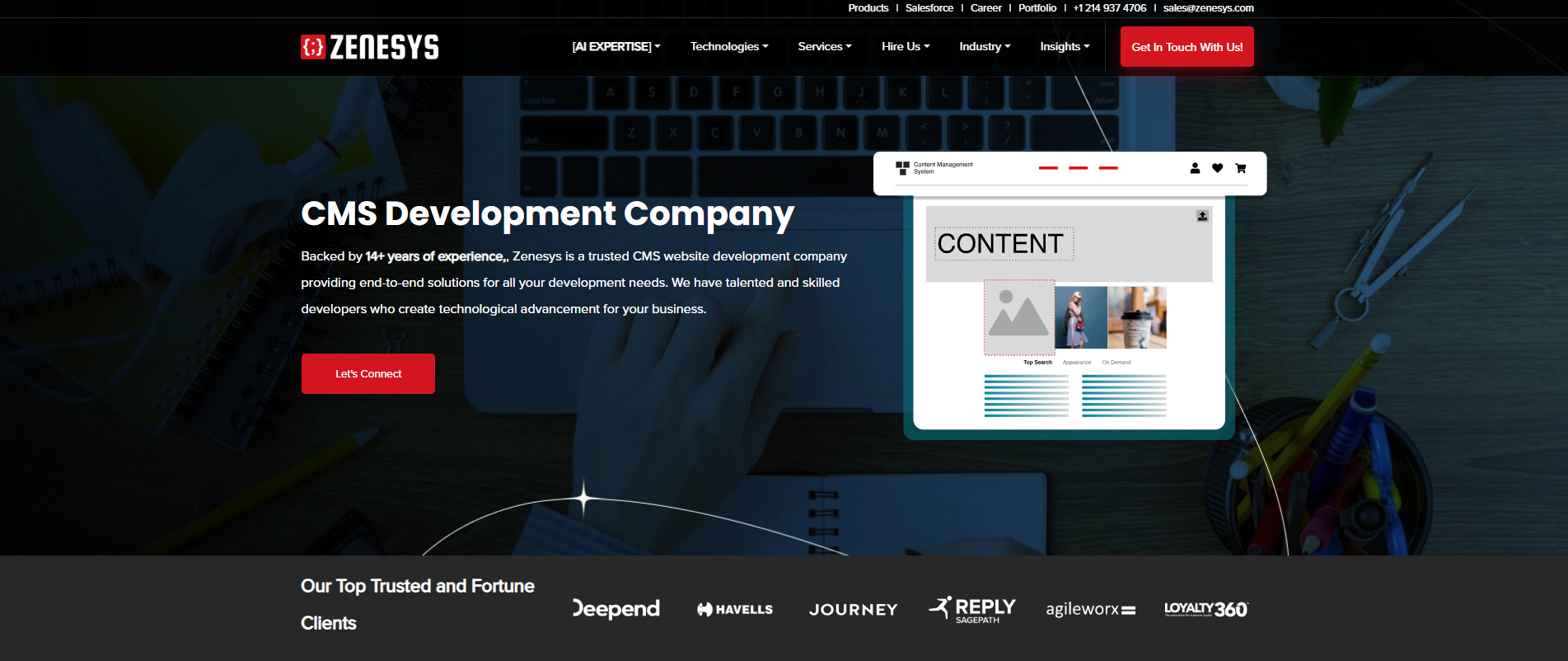
What’s interesting about Zenesys is how they evolved. In their early years, they primarily focused on Microsoft technologies and SharePoint-related projects. Today, their portfolio spans enterprise-grade CMS platforms like Sitecore and Kentico, while still serving businesses on open-source CMS like WordPress and Drupal. WordPress is a powerful, user-friendly CMS that offers a wide range of plugins and themes, making it a popular choice for blogs, startups, and small businesses.
For those opting for WordPress, choosing the right hosting for WordPress is essential to ensure reliable performance, security, and scalability as your website grows. A solid hosting foundation prevents slow load times and downtime, which can directly hurt conversions and user experience.
This track record shows a company that adapts to the market. As businesses shifted to cloud-based CMS and mobile-driven solutions, being a CMS development company in USA Zenesys expanded its technical stack and service range. That’s why they are the first choice on this list.
2. Sciencesoft
Founded: 1989
Location: McKinney, TX
Hourly Rate: $50 – $99
CMS Expertise: Magento (Adobe Commerce), WordPress, Shopify, Drupal, Headless CMS
Sciencesoft was founded in 1989, right around the time when businesses started taking digital adoption. With over 30 years in the market, they have carved out a strong presence in the eCommerce and enterprise CMS space.

This Custom CMS Development Company In USA became popular for its early adoption of Magento (now Adobe Commerce), helping retailers shift from static stores to fully managed, integrated online shops. As Shopify and headless CMS gained traction, they quickly adjusted to meet modern business demands.
Clients trust them not just for coding but for strategy-driven implementation, since they’ve been in the CMS space long enough to see multiple tech shifts and adapt accordingly.
3. Sapphire Software Solutions
Founded: 2002
Location: Plano, Texas
Hourly Rate: $35 – $65
CMS Expertise: WordPress, Joomla, Drupal, Shopify
Sapphire Software Solutions was established in 2002, making them one of the most experienced firms on this list. They’ve had more than two decades of building digital products, and that history shows in the breadth of industries they’ve served—from startups to educational institutions and healthcare providers.
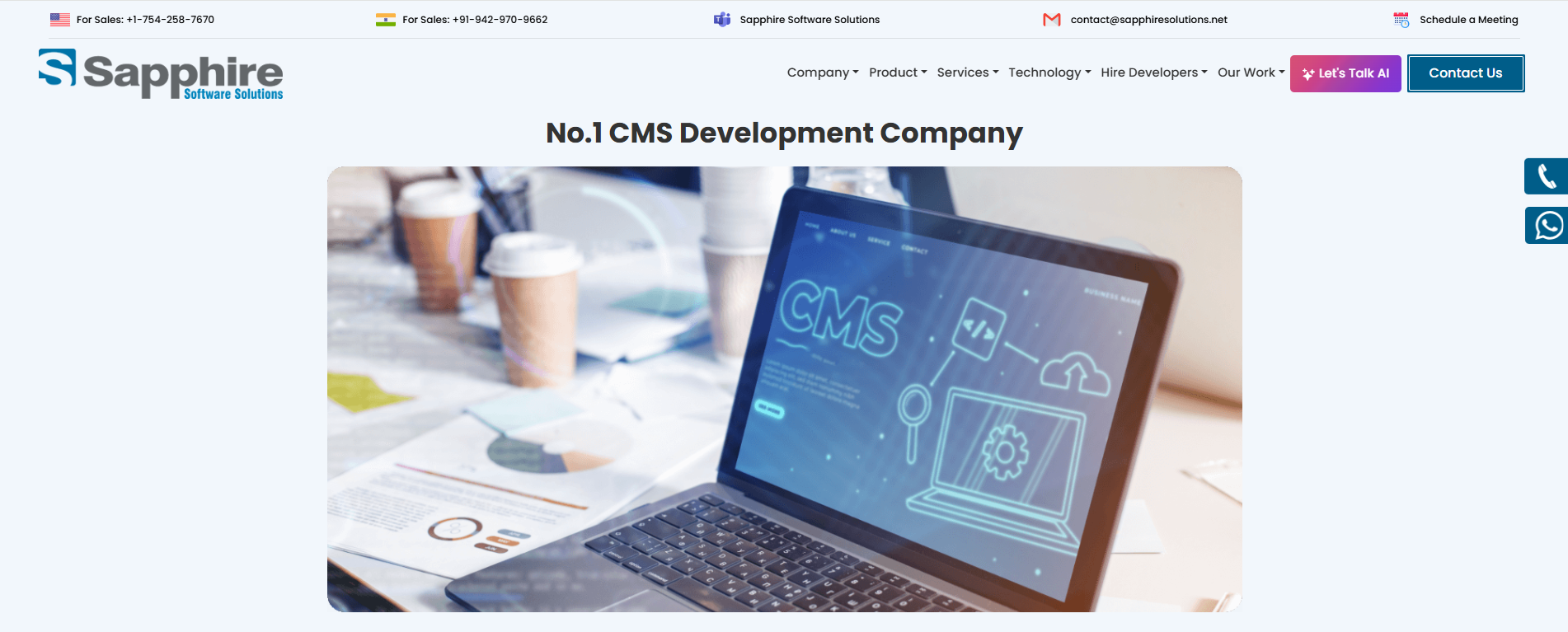
Their journey started when CMS platforms like Joomla and Drupal were gaining widespread traction. Over the years, they expanded into WordPress websites for SMEs and Shopify builds for retailers. This adaptability made them a trusted long-term partner at affordable rates.
The longevity of Sapphire says a lot: only firms that consistently deliver stay relevant for over 20 years in tech.
4. CMARIX
Founded: 2009
Location: Ahmedabad, India (serving USA extensively)
Hourly Rate: $40 – $75
CMS Expertise: WordPress, Drupal, Joomla, Magento, Custom CMS
CMARIX began in 2009 and quickly positioned itself as a global outsourcing partner, with a team strength that eventually crossed 200+. Although headquartered in India, CMARIX actively services US clients and has built strong credibility in the CMS space.
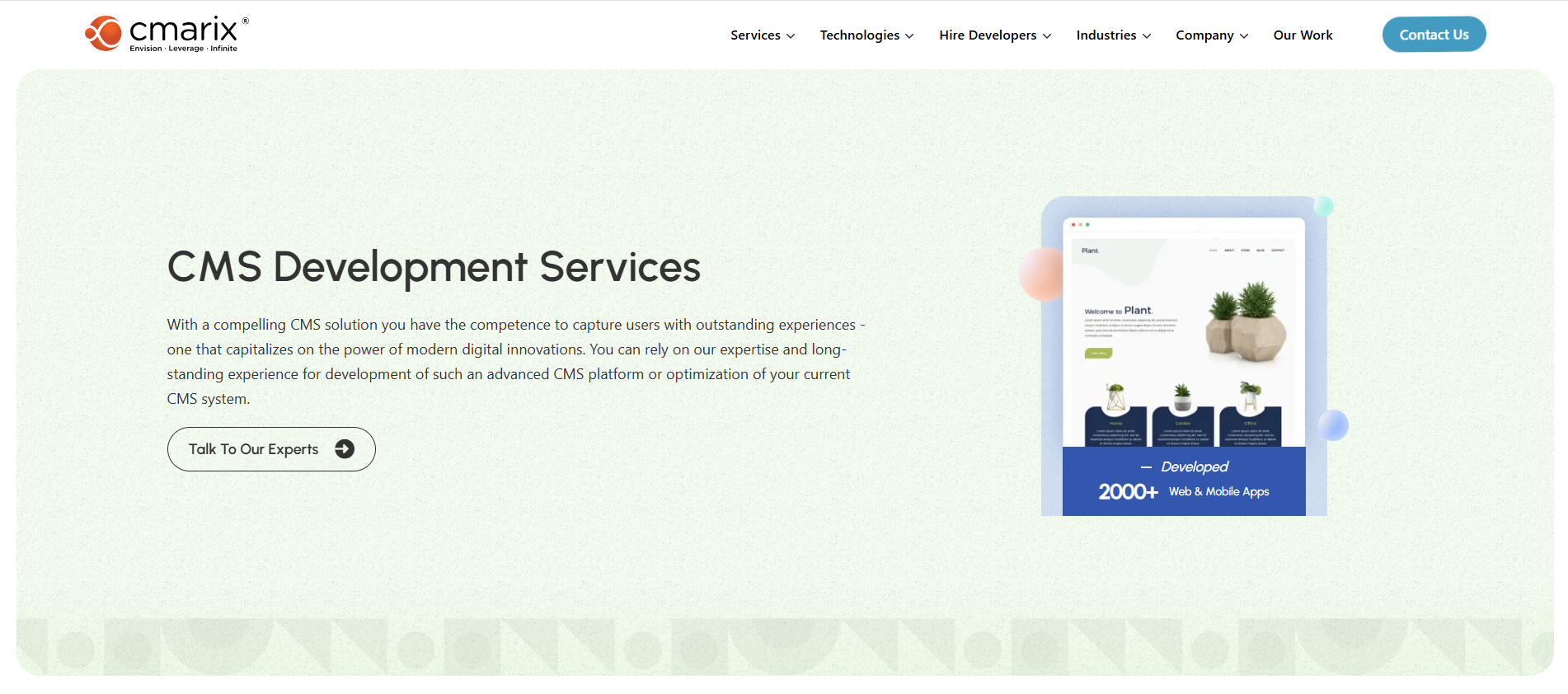
Their origin was in custom application development, but CMS solutions quickly became a major focus. Today, their WordPress, Magento, and Joomla projects are recognized for speed of delivery and scalable architectures.
The company’s consistent growth reflects its cost-effective yet enterprise-ready solutions—a balance not easy to maintain for over 15 years.
5. Radixweb
Founded: 2000
Location: Irvine, California
Hourly Rate: $50 – $110
CMS Expertise: Sitecore, Kentico, WordPress, Drupal, Adobe Experience Manager
Radixweb is another power player in large-scale CMS builds. What makes them stand out is their experience with enterprise CMS ecosystems that demand stability and integration across multiple business processes.
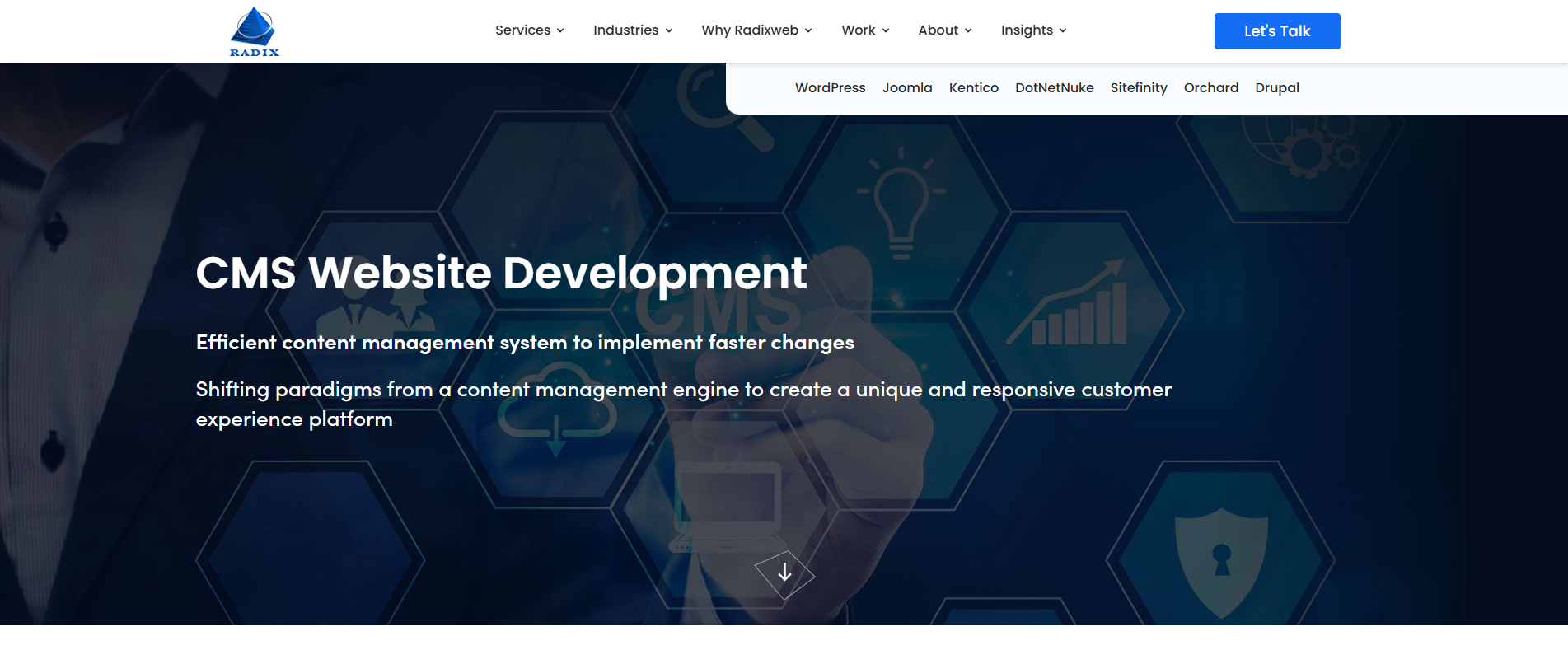
Their Sitecore and Kentico builds are known for performance. But they don’t shy away from open-source CMS either, especially when businesses prefer cost flexibility.
Enterprise clients report that Radixweb often helps beyond launch – with analytics, marketing integrations, and ongoing upgrades.
6. Iflexion
Founded: 1999
Location: Denver, Colorado
Hourly Rate: $60 – $140
CMS Expertise: Drupal, Sitecore, WordPress, Headless CMS
Iflexion was founded in 1999, making it one of the longest-running software development firms on this list. That’s more than two decades of experience building web and business applications.
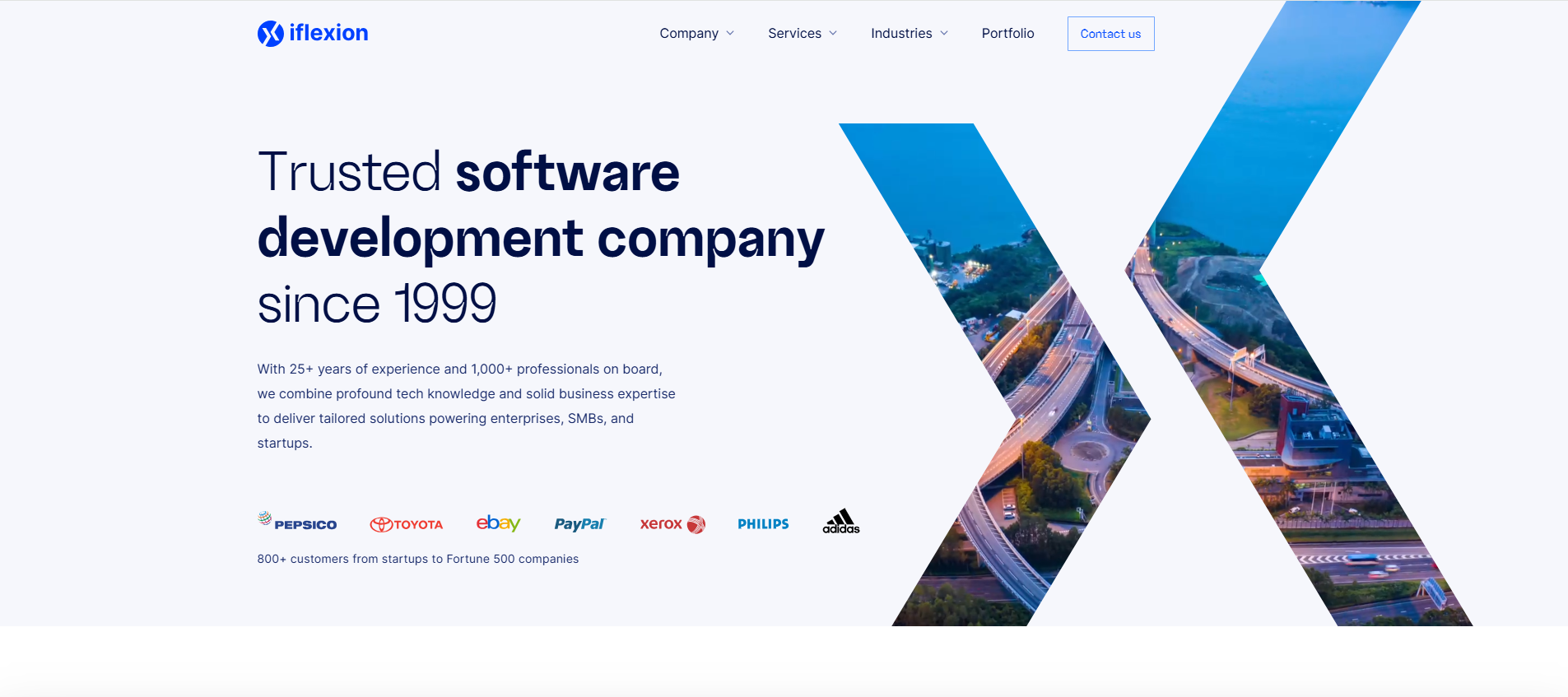
Over the years, they’ve built deep enterprise CMS expertise, with Drupal and Sitecore forming the backbone of many of their projects. But what sets them apart is their heavy focus on custom CMS builds and API-driven integrations.
They create systems that connect with CRMs, ERPs, HR tools, and SaaS platforms—perfect for enterprises that don’t just need a CMS, but an entire connected ecosystem.
7. Konstant Infosolutions
Founded: 2003
Location: New York, NY (HQ) with offshore development centers
Hourly Rate: $40 – $85
CMS Expertise: WordPress, Drupal, Joomla, Magento, Shopify
Konstant Infosolutions started in 2003 with a vision to deliver flexible, affordable web solutions that could scale as clients grew. In the early days, they were heavily involved with Joomla and Drupal projects, but as CMS technologies expanded, so did their portfolio.
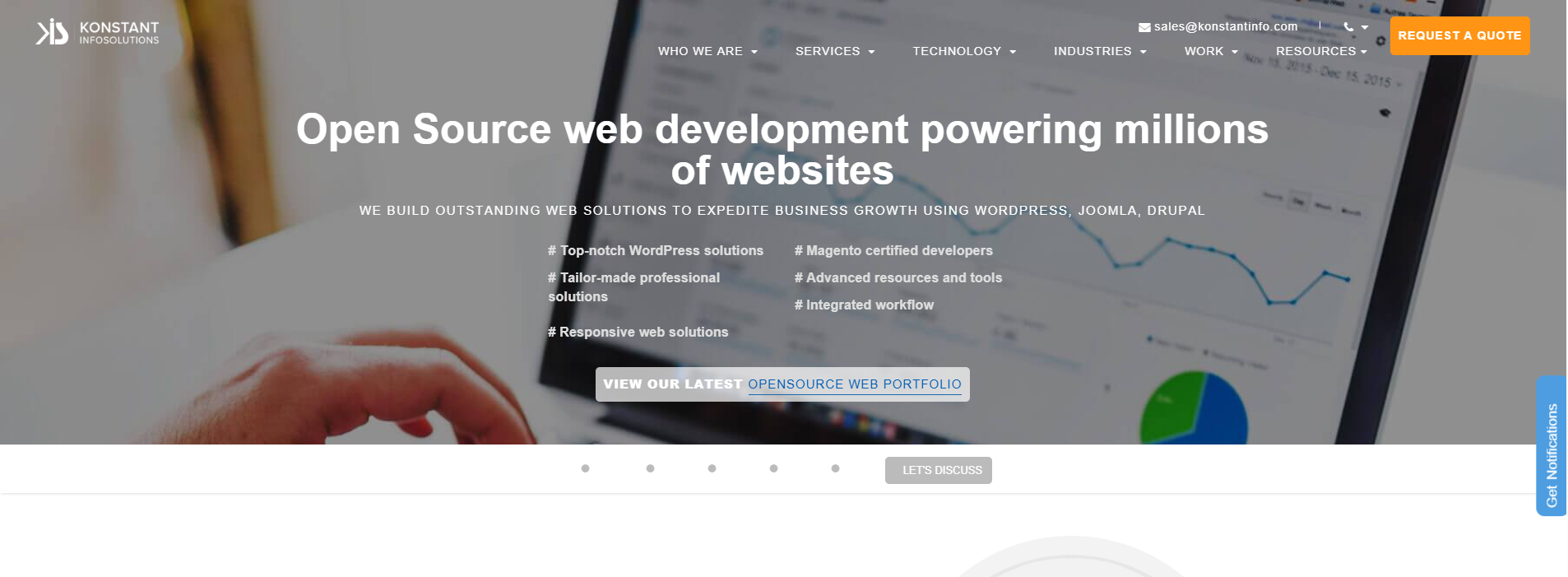
Today, Konstant is known for being tech-agnostic. They handle WordPress for startups, Magento and Shopify for product-heavy eCommerce CMS Website Development Companies, and Drupal for more advanced requirements.
Another reason they stand out: Konstant has served both startups and Fortune 500 companies—showing their ability to adapt to different budgets, team sizes, and goals.
8. ISHIR
Founded: 1999
Location: Dallas, Texas
Hourly Rate: $50 – $120
CMS Expertise: Sitecore, Kentico, WordPress, SharePoint CMS
ISHIR was established in 1999, at a time when businesses were just transitioning into serious online presence management. Over the years, they’ve established themselves as one of the trusted enterprise CMS partners in the US.
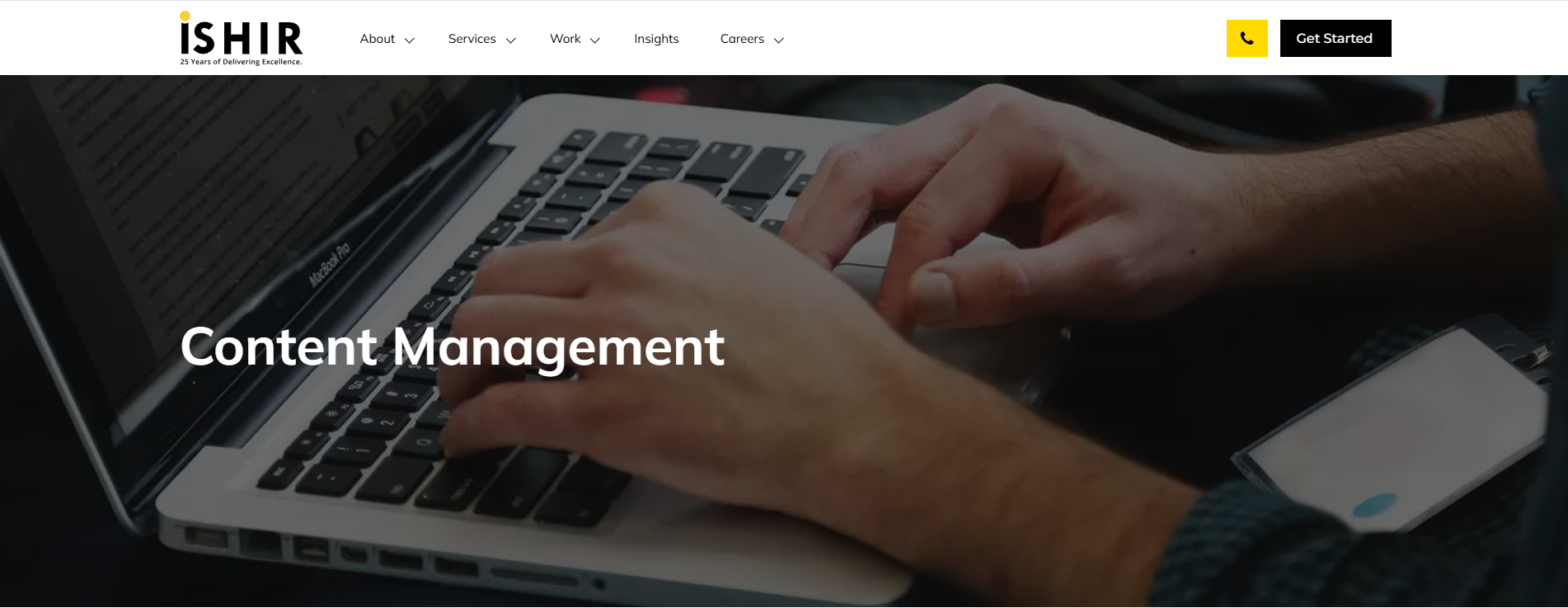
Their specialization in Sitecore, Kentico, and SharePoint CMS makes them stand out from smaller CMS agencies that focus only on WordPress or Shopify.
Security and compliance are central to ISHIR’s approach. Industries like healthcare, banking, and insurance often turn to them because of their experience with regulatory standards like HIPAA, GDPR, and PCI-DSS.
9. Coalition Technologies
Founded: 2009
Location: Los Angeles, California
Hourly Rate: $80 – $150
CMS Expertise: WordPress, Shopify, BigCommerce, WooCommerce
Coalition Technologies came onto the scene in 2009, right at the peak of eCommerce expansion in the US. Founded with a marketing-first mindset, they bridged two worlds most CMS Development Companies overlook: technical builds and digital marketing performance.
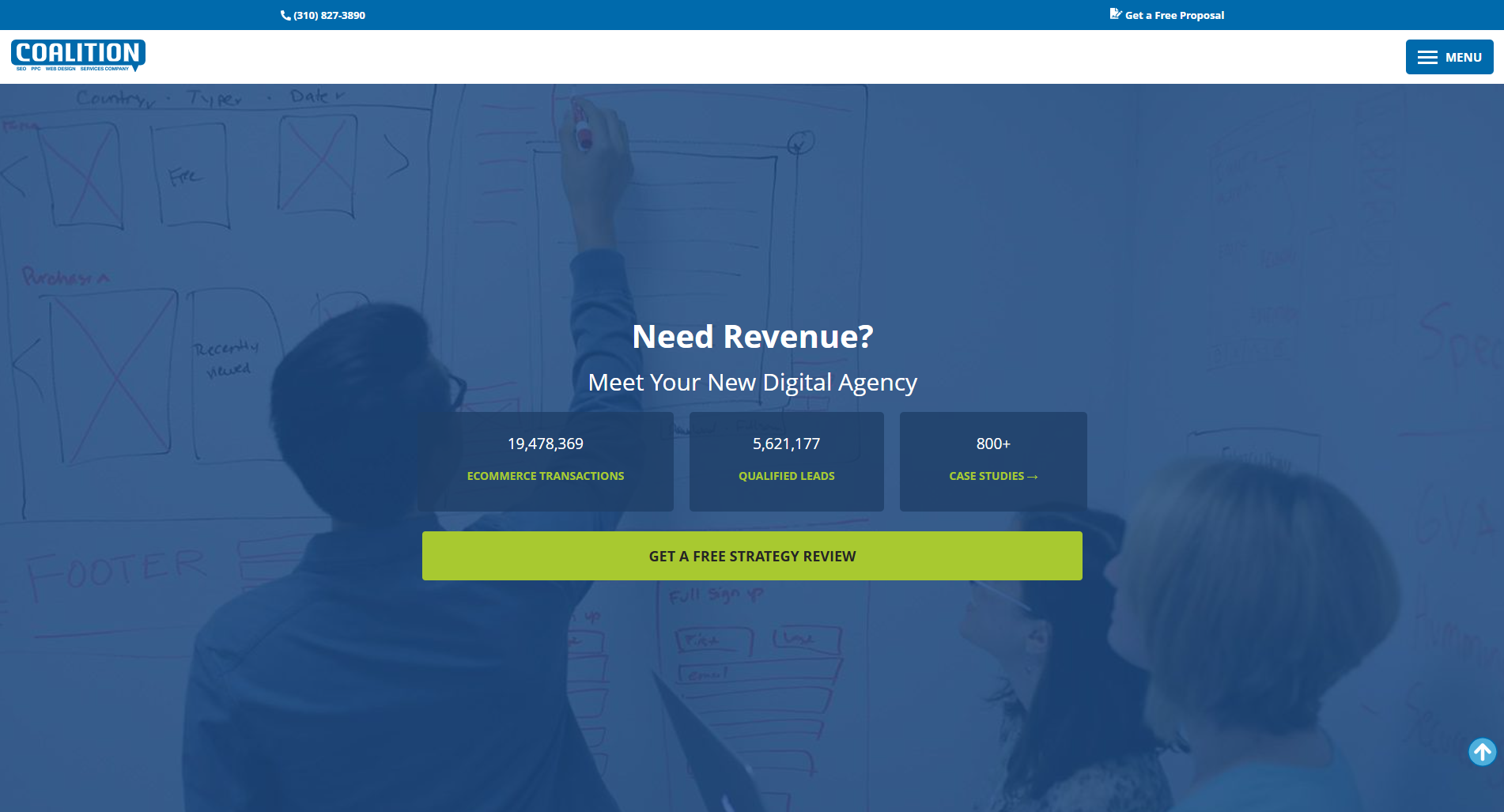
Instead of building just a functioning CMS site, Coalition creates websites tailored for visibility, conversions, and growth. Their core expertise with WordPress and Shopify allows them to create scalable eCommerce stores, while BigCommerce and WooCommerce solutions serve mid-market and enterprise clients.
10. Simform
Founded: 2010
Location: Austin, Texas
Hourly Rate: $60 – $130
CMS Expertise: WordPress, Drupal, Headless CMS, JAMstack
Simform started in 2010 with a tech-first approach. Unlike some agencies that only specialized in off-the-shelf CMS technologies, Simform positioned itself as a partner for future-ready web architectures.
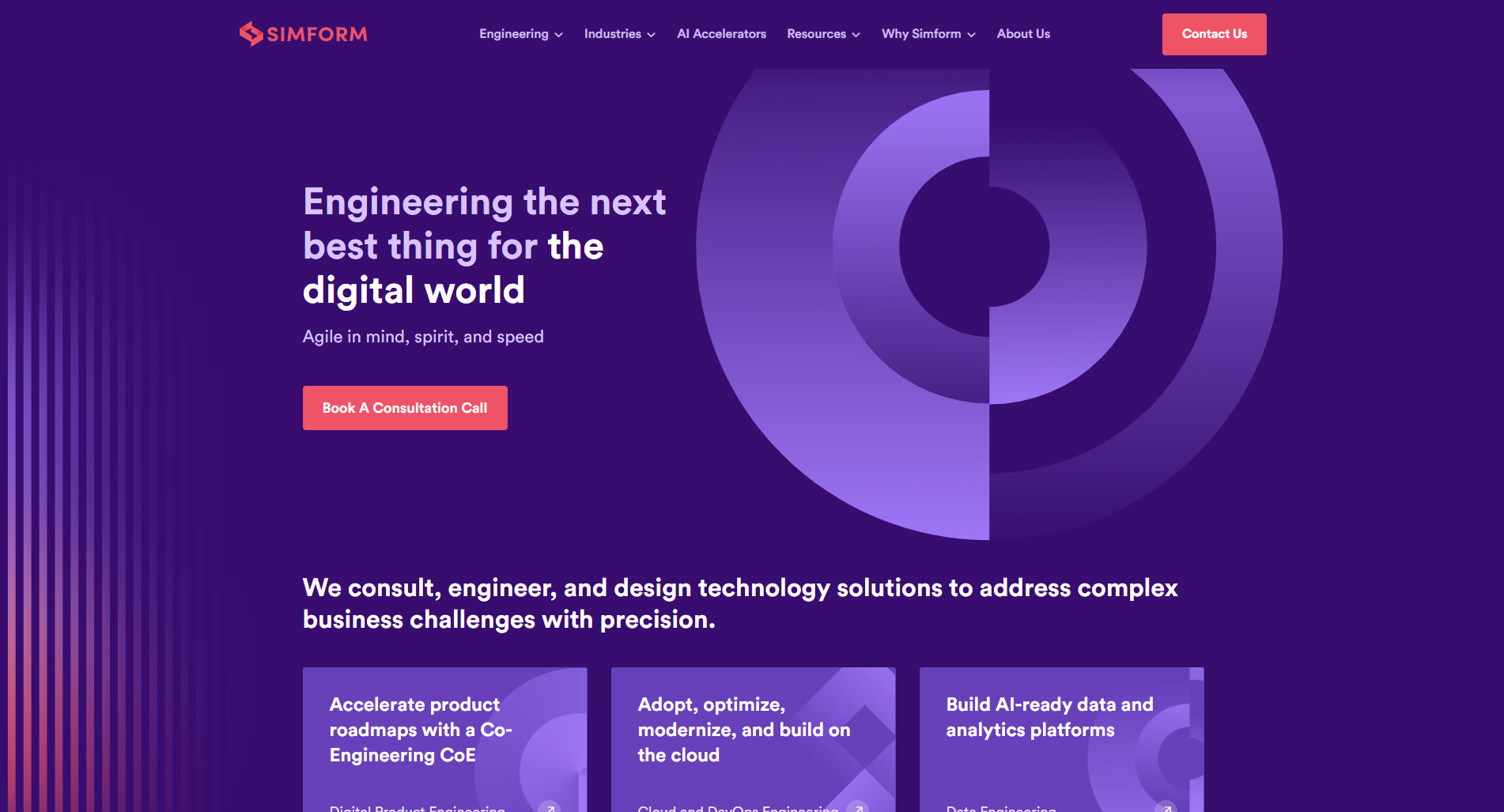
Their expertise in headless CMS and JAMstack makes them unique on this list. That means instead of just building traditional CMS websites, they excel at creating platforms that separate content from the front-end UI.
That said, Simform also stays practical. They build WordPress and Drupal projects for companies that want to stick to known technologies while leaving the door open for multi-channel content delivery.
How to Choose the Right CMS Development Partner
By now, you’ve seen the wide spectrum. From affordable providers like Sapphire to enterprise-ready giants like Radixweb and Zenesys. So, how do you pick?
Step 1: Define What You Actually Need
Before you even start evaluating partners, you need clarity on what you’re solving for. Ask yourself:
- Do you need a simple CMS for content publishing?
- Or do you need an enterprise-grade system that supports personalization, multi-language sites, and integrations with CRM, ERP, and analytics?
- Are you looking for a one-time project, or an ongoing partnership?
Step 2: Look Beyond Technical Skills
Sure, technical expertise matters. But it’s not the only thing that matters. A CMS partner isn’t just writing code. They’re building something that’s supposed to support your marketing, sales, and customer engagement for years.
Here’s what you should look for beyond the tech:
- Industry knowledge – Do they understand how CMS works in your sector (retail, healthcare, finance)?
- UX focus – Do they talk about user experience, not just backend logic?
- Content strategy awareness – Do they understand how your team will actually use the CMS day-to-day?
Step 3: Check Their Portfolio Like a Detective
Don’t just glance at their case studies. Study them. Look for projects that are similar to yours in scale, industry, or complexity.
Here’s why:
- If they’ve built large eCommerce platforms, they know how to handle high traffic and transactions.
- If they’ve worked on healthcare CMS projects, they’ll understand compliance requirements.
- If they’ve handled multilingual sites, they’ll know the pitfalls of localization.
And don’t just take their word for it. Ask for live links. Use tools like BuiltWith to check what technologies they’ve actually implemented.
Step 4: Transparency in Pricing
Here’s a hard truth: most CMS projects go over budget. Why? Hidden costs. Partners often give a low upfront quote to win the deal, but later add charges for integrations, plugins, maintenance, or training.
To avoid this, ask for:
- A detailed breakdown of costs.
- What’s included and what’s extra.
- Ongoing support and hosting fees.
A trustworthy CMS partner won’t shy away from this conversation. If they dodge, that’s your red flag.
Step 5: Evaluate Their Communication Style
Here’s something most businesses underestimate: communication can make or break your CMS project. A technically skilled team that doesn’t communicate clearly will leave you confused, frustrated, and stuck waiting for updates.
Ask yourself:
- Are they proactive about updates, or do you have to chase them?
- Do they offer project management tools for visibility (like Jira, Trello, Asana)?
Remember, CMS projects often run for months. If communication is weak now, imagine what it will be like six months in.
Step 6: Think Long-Term, Not Just Launch
Many companies make the mistake of thinking the CMS project ends at launch. It doesn’t. Your CMS needs ongoing updates, security patches, content changes, and feature enhancements.
Ask potential partners:
- Do they offer maintenance packages?
- How fast is their response time for issues?
- Do they provide training for your team?
Step 7: Test Their Scalability Mindset
You’re not building a CMS for today. You’re building it for the next 3–5 years. That means scalability matters. Your partner should be able to answer questions like:
- How will the CMS handle traffic spikes?
- Can we add new features without breaking the system?
- What happens if we expand to multiple regions or languages?
Step 8: Verify Security Practices
This one’s non-negotiable. Ask your CMS partner:
- Do they follow OWASP security guidelines?
- How do they handle user authentication?
- What’s their process for patching vulnerabilities?
Step 9: Client References Tell the Truth
A polished website can hide flaws. Client references don’t. Ask for at least three references. And when you speak to them, don’t just ask if the project was delivered. Ask:
- How responsive was the team?
- Did they stick to timelines and budgets?
- How is the CMS holding up one year later?
Step 10: Cultural Fit and Values
This might sound soft, but it matters. Your CMS partner will be working with your internal team for months, maybe years. If their work culture clashes with yours, it’s going to create friction.
Ask yourself:
- Do they respect deadlines the way your team does?
- Do they value transparency, or do they hide behind technical excuses?
- Do they align with your long-term vision, or just treat this as another project?
Conclusion
A well-designed CMS can reduce friction, improve user experience, and directly drive revenue, while the wrong choice can quietly cost you conversions day after day. The companies we’ve highlighted each bring distinct strengths, from enterprise-grade Sitecore and Adobe Experience Manager solutions to flexible, cost-effective WordPress and Shopify builds.
The key is not chasing the most popular platform, but finding a partner who understands your industry, your long-term goals, and your team’s day-to-day realities.
Look for scalability, transparency, strong communication, and a track record of success—not just coding capability. With the right CMS partner, you’re not just launching a website; you’re building a digital ecosystem that fuels growth, adapts to change, and keeps you competitive in the years ahead.
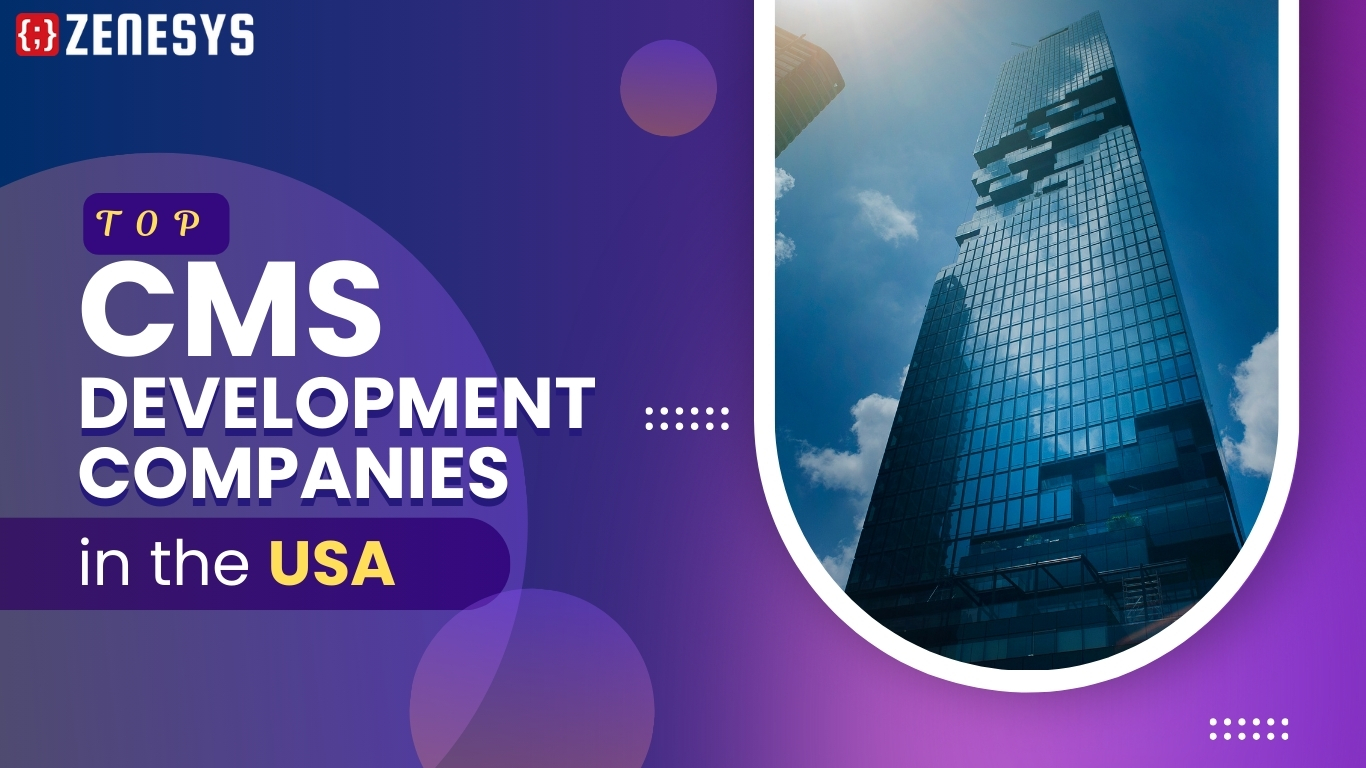

.webp?lang=en-US&ext=.webp)

.webp?lang=en-US&ext=.webp)

